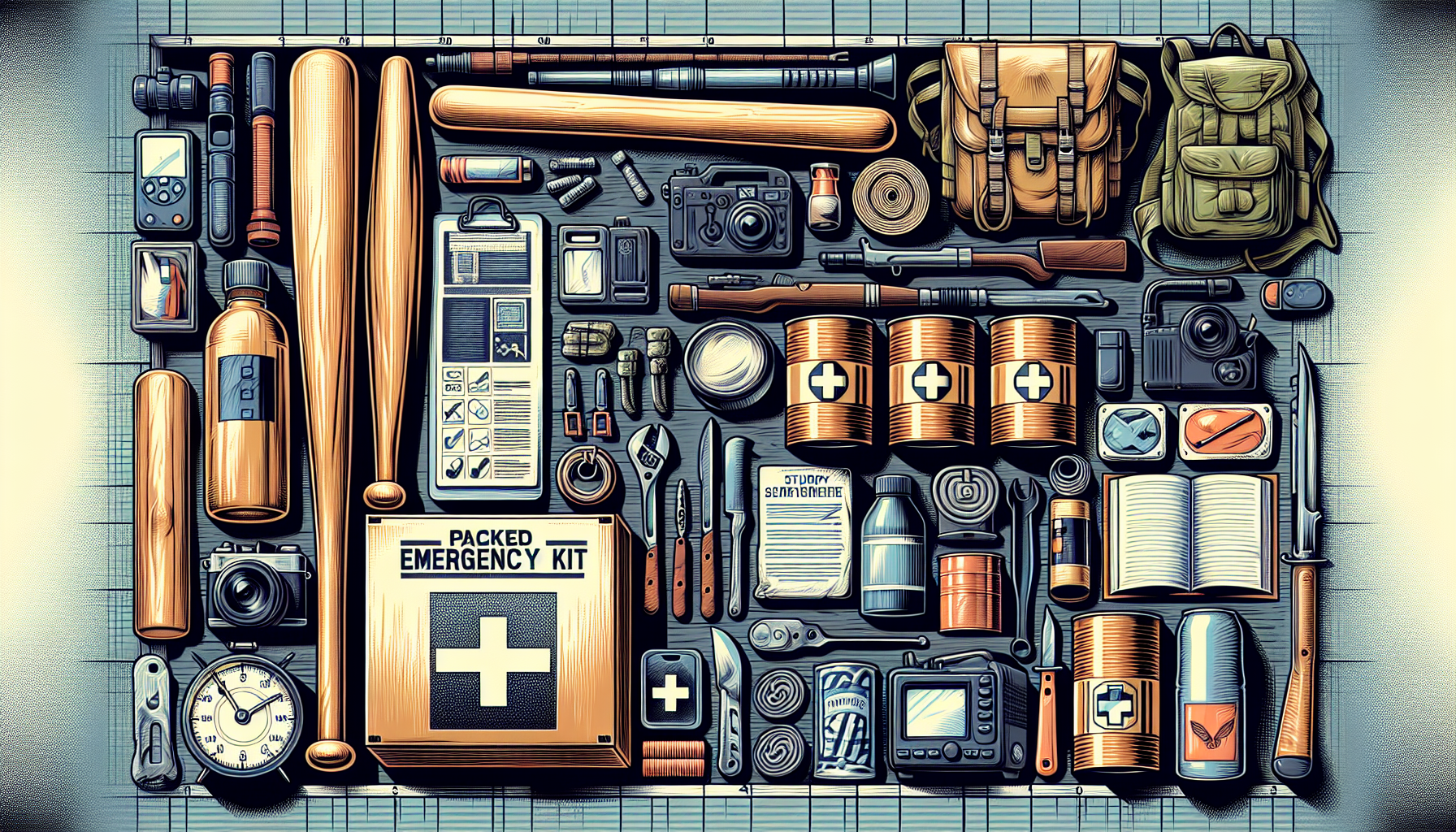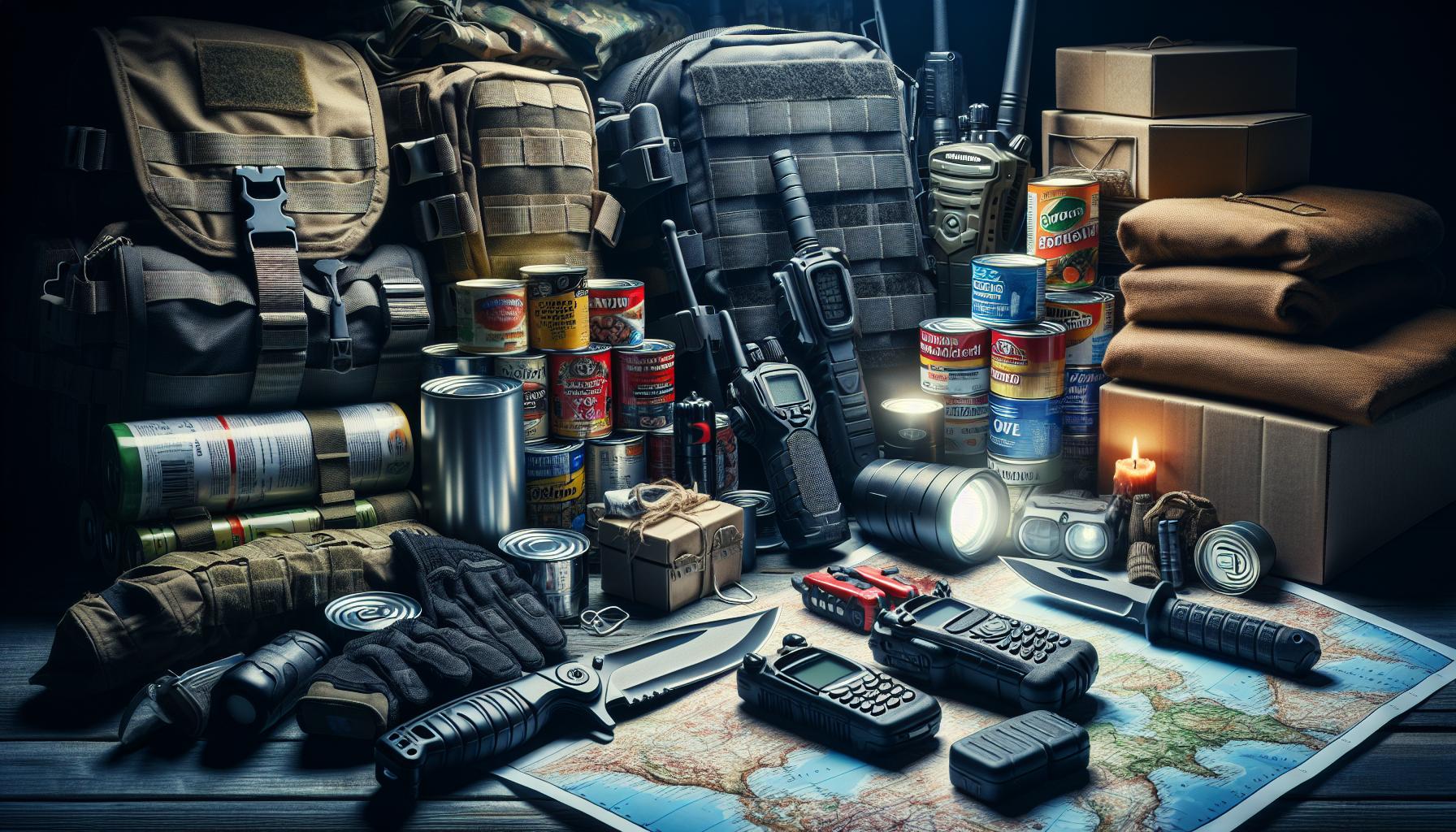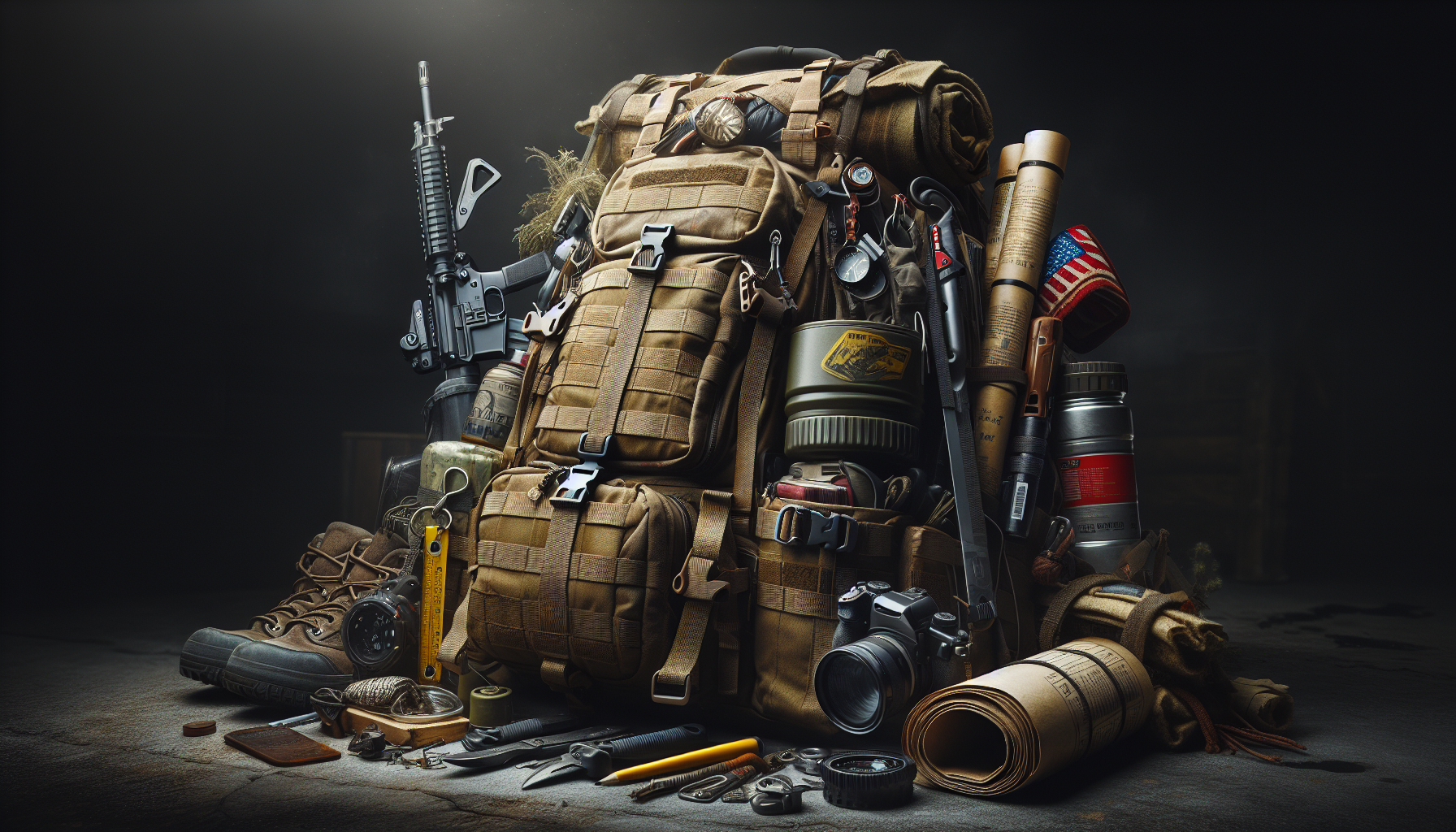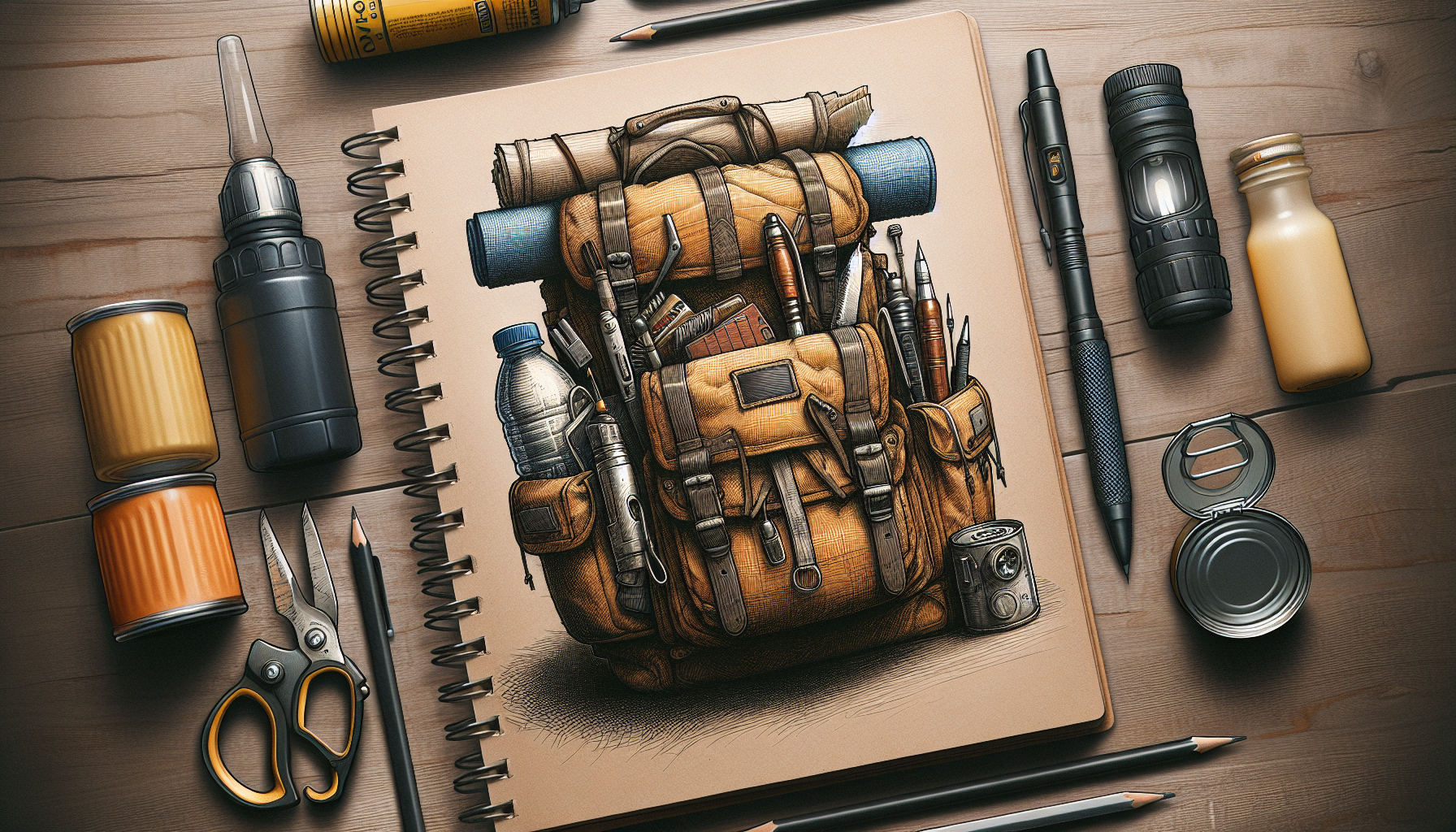Imagine for a moment a world turned upside down, where chaos reigns and the familiar comforts of daily life are nothing but a distant memory. In this article, we will explore the basics of SHTF (Sh*t Hits The Fan) scenarios, providing you with valuable insights and practical tips to navigate through the unknown. From preparing your survival kit to honing essential skills, join us on this journey as we unravel the secrets to facing the unexpected with confidence.
Understanding SHTF
Definition of SHTF
SHTF is an abbreviation commonly used in the prepper community, which stands for “Shit Hits The Fan.” It refers to a scenario where there is a breakdown of essential systems and services in society, leading to widespread chaos and uncertainty. This could result from natural disasters, economic collapse, political unrest, or any other unforeseen event that disrupts our normal way of life.
During an SHTF situation, there may be limited access to food, water, medical supplies, and other essential resources. Law enforcement and emergency services could be overwhelmed or unavailable, making it crucial for individuals to be self-reliant and prepared.
Common scenarios that can lead to SHTF
While we hope that we never experience an SHTF situation, it is essential to be aware of the potential scenarios that could lead to such circumstances. Some common examples include:
-
Natural disasters: Earthquakes, hurricanes, floods, wildfires, and other natural calamities can devastate communities and disrupt essential services.
-
Economic collapse: Financial crises, hyperinflation, or economic recessions can result in a collapse of the banking system, skyrocketing prices, and widespread unemployment.
-
Civil unrest: Social or political upheavals, riots, or even terrorist attacks can lead to a breakdown of law and order, making it unsafe to navigate public spaces.
-
Pandemics: Outbreaks of infectious diseases with high transmission rates, like the recent COVID-19 pandemic, can strain healthcare systems and disrupt everyday life.
-
Cyberattacks: As our reliance on technology grows, the risk of cyberattacks disrupting critical infrastructures such as power grids, communication networks, and financial systems also increases.
Importance of being prepared for SHTF
Being prepared for an SHTF situation is crucial for several reasons. It allows you to:
-
Ensure the safety and well-being of yourself and your loved ones: Being prepared with necessary supplies, skills, and knowledge can help you survive and navigate through challenging situations, minimizing the risk to yourself and those around you.
-
Maintain personal security: In an SHTF situation, the breakdown of societal order may lead to an increase in crime and violence. By taking precautions, such as learning self-defense techniques and securing your property, you can enhance personal security.
-
Preserve essential resources: By stockpiling essential supplies and knowing how to source food and water, you can reduce the strain on public resources and ensure their availability for those who need them most.
-
Aid in community resilience: When individuals within a community are well-prepared, it fosters collective strength and unity. By sharing knowledge, resources, and supporting each other, communities can better withstand and recover from SHTF scenarios.
-
Adapt to changing circumstances: Developing the necessary mental and emotional resilience, as well as acquiring skills and knowledge, equips you to adapt to changing situations effectively. This flexibility can be crucial in surviving and thriving during and after an SHTF event.
Essential Skills and Knowledge
First aid and medical skills
During an SHTF event, professional medical help may not be readily available. Knowing how to perform basic first aid, administer CPR, treat wounds, and handle medical emergencies becomes critical. Enrolling in first aid and CPR courses, reading medical literature, and practicing these skills regularly will ensure you can provide necessary medical care when needed.
Self-defense and personal security
In situations where law enforcement may not be able to respond promptly, it is important to have the knowledge and skills to protect yourself and your loved ones. Learning self-defense techniques, understanding situational awareness, and securing your home are all vital components of personal security during an SHTF situation.
Basic survival skills
Knowing how to build a fire, find and purify water, construct a shelter, and navigate without modern technology are all fundamental survival skills. These skills can be learned through books, online resources, or even attending survival courses. Practicing these skills in various outdoor settings will enhance your ability to fend for yourself during an SHTF scenario.
Navigational skills
In an SHTF event, traditional navigation systems like GPS may not be operational. Learning how to use a compass, read maps, and navigate using landmarks and natural signs is essential. Regular practice and familiarization with local geography will help you navigate effectively in unfamiliar territory.
Emergency communication skills
Having the ability to communicate with others during an SHTF situation can be a matter of life or death. Learning basic radio communication skills, understanding different frequencies, and having alternative communication methods can help you stay connected with loved ones and gather essential information.

Physical Preparation
Stockpiling essential supplies
One of the most important aspects of being prepared for SHTF is having an adequate supply of essential items. This includes non-perishable food items, clean drinking water, medications, toiletries, batteries, flashlights, and other necessary supplies. Creating a comprehensive list and gradually accumulating these items will ensure you have what you need during challenging times.
Creating a bug out bag
A bug out bag, also known as a go-bag, is a portable kit that contains essential items to sustain you for at least 72 hours during an evacuation or emergency situation. It should include food, water, clothing, first aid supplies, tools, and other necessary items. Regularly reviewing and updating your bug out bag will ensure it is always ready to grab and go when needed.
Building a shelter
In an SHTF scenario, you may need to rely on your ability to create temporary shelter. Learning basic construction techniques, such as building a debris shelter or setting up a tent, will provide you with the necessary skills to protect yourself from the elements. Understanding different shelter options based on your environment and climate is crucial for your survival.
Securing a reliable food and water source
When the normal food supply chain is disrupted, having alternative methods to source food and water becomes essential. This could include growing your own food through gardening, learning to forage for edible plants, or raising small animals for sustenance. Additionally, knowing how to find, collect, purify, and store water is vital for your survival.
Personal hygiene and sanitation
Maintaining good personal hygiene and proper sanitation practices is crucial to prevent the spread of diseases, especially in an SHTF situation. Stocking up on necessary hygiene products, learning alternative sanitation methods, and prioritizing cleanliness will help keep you and your surroundings healthy and safe.
Mental and Emotional Preparedness
Developing resilience and adaptability
An SHTF scenario can be mentally and emotionally challenging. Developing resilience, the ability to bounce back from adversity, and adaptability, the capacity to adjust to new circumstances, are crucial for your well-being. Cultivating a mindset that embraces change, reframing challenges as opportunities, and practicing mindfulness can all contribute to your mental and emotional preparedness.
Managing stress and anxiety
During times of crisis, stress and anxiety levels can skyrocket. Learning stress management techniques, such as deep breathing exercises, meditation, and physical activity, can help regulate your emotions and reduce anxiety. Additionally, finding healthy outlets for emotional expression, such as journaling or talking to a trusted friend or family member, can be beneficial.
Maintaining a positive mindset
Having a positive mindset during challenging times can significantly impact your resilience and overall well-being. Focusing on gratitude, practicing optimism, and celebrating small victories can help maintain motivation and boost morale. Surrounding yourself with positive influences and avoiding excessive exposure to negative news or social media can also contribute to a positive mindset.
Building a support network
Having a reliable support network is invaluable during an SHTF situation. Cultivating strong relationships with family, friends, and neighbors who share similar preparedness values ensures you have people to rely on and collaborate with in times of need. Participating in local community groups or joining prepper networks can help you build a supportive community.

Security Measures
Securing your property
Ensuring the security of your property during an SHTF event is essential. This includes reinforcing doors and windows, installing security systems, and implementing strong access control measures. By making your property less attractive to potential threats, you increase the likelihood of deterring would-be criminals.
Basic home defense strategies
Learning basic home defense strategies can help you protect yourself and your loved ones in case of a security breach. This may include understanding safe room design, creating escape routes, or installing security measures like motion sensor lights or security cameras. Regularly practicing drills and scenarios with your household members will help everyone be prepared.
Establishing community security measures
Collaborating with your neighbors to establish community security measures creates a united front against potential threats. This could involve creating a neighborhood watch program, organizing regular meetings to discuss security concerns, and sharing resources and information. A strong community bond is an effective deterrent and can enhance security during an SHTF scenario.
Understanding the importance of OPSEC
OPSEC, or Operational Security, refers to the practice of safeguarding sensitive information that could be exploited by adversaries. In an SHTF situation, maintaining OPSEC is crucial to protect yourself and your community from potential threats. This involves being cautious about sharing sensitive details about your preparedness levels, resources, or plans with individuals outside your trusted circle.
Implementing self-defense tactics
Knowing self-defense tactics is crucial for protecting yourself when confronted with physical threats. Enrolling in self-defense classes, learning basic martial arts techniques, or practicing situational awareness can help you effectively respond to potential dangers. Remember, the best self-defense strategy is to avoid or de-escalate confrontations whenever possible.
Emergency Planning
Creating a comprehensive emergency plan
Having a well-thought-out emergency plan can significantly increase your chances of successfully navigating an SHTF scenario. This plan should outline essential steps to take, including evacuation routes, rendezvous points for family members, and communication protocols. Regularly reviewing and updating this plan as needed keeps it relevant and effective.
Identifying potential threats and risks
Understanding the potential threats and risks specific to your geographical area or situation is vital for effective emergency planning. This could include assessing the likelihood of natural disasters, mapping out potential security concerns, or identifying proximity to critical resources. By being aware of these risks, you can tailor your emergency plan accordingly.
Establishing communication protocols
Establishing clear communication protocols within your family or community is crucial during an SHTF event. This includes determining primary and secondary communication methods, establishing meeting points, and designating individuals responsible for relaying information. Regularly testing these communication systems and practicing drills will ensure everyone understands their roles and responsibilities.
Assigning roles and responsibilities
In an emergency situation, having designated roles and responsibilities ensures an organized and efficient response. Identify individuals within your family or community who have specific skills or knowledge and allocate tasks accordingly. This could include assigning someone as the medical responder, communication coordinator, or security lead.
Conducting regular drills and practice sessions
Regularly practicing your emergency plan through drills and simulations helps identify any gaps or areas that need improvement. This could involve conducting fire drills, practicing evacuation procedures, or simulating various emergency scenarios. By regularly refreshing your skills and addressing any deficiencies, you can enhance your preparedness level.

Financial Preparedness
Building an emergency fund
Having an emergency fund is essential for financial preparedness during an SHTF situation. Aim to save enough money to cover at least six months’ worth of essential expenses, including food, water, shelter, and medical supplies. This fund will provide a safety net during times of economic uncertainty or job loss.
Prioritizing essential expenses
In a crisis situation, it becomes crucial to prioritize essential expenses over non-essential ones. Review your budget and identify areas where you can reduce expenses. Ensure you have enough funds allocated for necessary supplies, medical needs, and maintaining your shelter and personal security.
Diversifying investments
Diversifying your investments helps protect your financial stability during an SHTF scenario. Instead of relying solely on one investment vehicle, consider diversifying your portfolio across different asset classes, such as stocks, bonds, real estate, or precious metals. This diversification can help mitigate the risks associated with market volatility.
Understanding bartering and trade
During an SHTF event, traditional currency may lose its value or accessibility. Understanding the concept of bartering, or trading goods and services without using money, becomes essential. Identify essential items that are highly sought after and consider stockpiling them for potential future trade or bartering opportunities.
Protecting valuable assets
In a crisis situation, protecting your valuable assets becomes crucial. This includes securing important documents like identification papers, insurance policies, and legal documents in a waterproof and fireproof safe. Additionally, consider purchasing insurance to safeguard your property, possessions, and investments from potential risks.
Medical Preparedness
Stocking up on necessary medications
If you or your family members rely on prescription medications, it is important to have an ample supply in case of an SHTF event. Work with your healthcare provider to ensure you have a stockpile of necessary medications that can last for an extended period. Regularly rotate and update your supply to avoid using expired medications.
Learning basic medical procedures
In situations where professional medical help may not be available, having the knowledge of basic medical procedures can save lives. Learn techniques such as CPR, wound care, splinting broken bones, and providing emergency medical treatment. Familiarize yourself with medical literature or consider taking first aid courses to expand your medical knowledge.
Establishing a medical kit
Having a well-stocked medical kit is crucial for addressing minor injuries or illnesses during an SHTF situation. Include items such as bandages, antiseptics, pain relievers, sterile gloves, and other medical supplies. Regularly check your medical kit to ensure it is up to date and replenish any expired or depleted items.
Identifying and treating common illnesses and injuries
Knowing how to identify and treat common illnesses and injuries is vital when professional medical help is limited. Educate yourself on the signs and symptoms of prevalent ailments like infections, respiratory issues, or basic fractures. Understand how to administer appropriate first aid and when to seek additional medical assistance.
Understanding the risks of infectious diseases
During an SHTF event, the risk of infectious diseases may increase due to disrupted healthcare systems and inadequate sanitation measures. Understanding how diseases spread, practicing proper hygiene and sanitation protocols, and taking preventive measures like vaccinations where available, can help protect yourself and others from these potential risks.

Information and Communication
Staying informed through various sources
In an SHTF event, accurate and timely information becomes crucial. Stay informed through various sources such as local news, emergency services updates, and government advisories. Utilize reliable online platforms, radio broadcasts, or social media channels dedicated to disseminating emergency information.
Establishing alternative communication methods
Prepare for scenarios where traditional forms of communication may not be available or reliable. Establish alternative communication methods, such as two-way radios, satellite phones, or hand signals, to stay in touch with loved ones or your community. Test these communication methods regularly to ensure they are functioning properly.
Understanding the importance of information security
During an SHTF event, protecting sensitive information becomes essential. Be cautious about sharing personal details or emergency preparedness plans online or with individuals you do not trust. Understand the risks of cybersecurity breaches and take steps to secure your digital information.
Learning basic radio communication skills
Having basic radio communication skills can prove invaluable during an SHTF scenario. Learn how to operate a two-way radio, understand common radio protocols, and practice effective communication techniques. Maintaining a radio that runs on alternative power sources, such as batteries or hand-crank chargers, will ensure you can communicate even during power outages.
Creating a communication plan
Establish a communication plan with your family or community members to ensure effective information sharing during an emergency. This plan should include designated communication channels, frequencies, meeting points, and designated individuals responsible for relaying information. Regularly practice using these communication methods and update your plan as needed.
Legal Considerations
Understanding relevant laws and regulations
Being aware of relevant laws and regulations is crucial during an SHTF situation. Understand the legal framework surrounding self-defense, property rights, and emergency protocols in your jurisdiction. Research local laws to ensure you are aware of your rights and responsibilities during a crisis.
Knowing your rights and responsibilities
Understanding your rights and responsibilities as an individual or member of a community is vital during an SHTF event. Familiarize yourself with your legal rights, obligations, and restrictions in various scenarios. This knowledge will help you make informed decisions and navigate potential legal challenges effectively.
Preparing legal documents and identification
Having essential legal documents readily accessible can save time and avoid complications during an emergency. Secure copies of documents such as passports, identification cards, birth certificates, insurance policies, and property deeds in a waterproof and fireproof safe. Consider creating digital copies as well and store them securely.
Understanding self-defense laws
Knowing the laws regarding self-defense in your jurisdiction is essential for protecting yourself and your loved ones. Research and understand the legal boundaries and requirements for using force in different scenarios. This knowledge will help you make informed decisions and ensure you stay within the limits of the law.
Navigating potential legal challenges
In an SHTF situation, legal challenges may arise unexpectedly. Prepare yourself by seeking legal advice, consulting with experts, or joining communities that focus on prepping and legal considerations. By having a basic understanding of the legal system and potential legal challenges, you can better protect yourself and your interests.
In conclusion, understanding SHTF and being prepared for such scenarios is essential for your safety, security, and well-being. By acquiring essential skills and knowledge, physically preparing with necessary supplies and resources, developing mental and emotional resilience, implementing security measures, creating a comprehensive emergency plan, ensuring financial stability, and addressing medical and legal considerations, you can greatly enhance your preparedness level. Remember, being proactive and staying informed are key to effectively navigating an SHTF situation and minimizing the impact it may have on your life. Stay prepared, stay safe!
